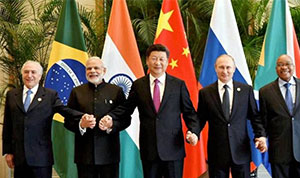(FREE) UPSC Current Affairs 2025 PDF
NEW! The Gist (OCT-2025) | E-BOOKS
BRICS Summit: Important Topics for UPSC Exams
BRICS Summit: Important Topics for UPSC Exams
 What
is BRICS?
What
is BRICS?
- BRICS is the acronym for an association of five major emerging national economies: Brazil, Russia, India, China and South Africa.
- BRIC started as a formal grouping in 2006 on the margins of G8 outreach summit.
- Originally the first four were grouped as "BRIC" before the induction of South Africa in 2010.
- 1st Summit was held in Russia in 2009. Moreover 1st, 5 member BRICS summit was held in 2011.
- Since 2009, the BRICS nations have met annually at formal summits. 8th summit in 2016 was held in Goa and BIMSTEC countries were invited for a joint summit as per the the tradition. 9th summit will be held in China.
What is the Significance of BRICS?
- Starting essentially with economic issues of mutual interest, the agenda of BRICS meetings has considerably widened over the years to encompass topical global issues.
- BRICS cooperation has two pillars – consultation on issues of mutual interest through meetings of Leaders as well as of Ministers of Finance, Trade, Health, S&T, Education, Agriculture, Communication, Labour, etc. and practical cooperation in a number of areas through meetings of Working Groups/Senior Officials.
- Regular annual Summits as well as meetings of Leaders on the margins of G20 Summits are held. It has been pushing for greater economic growth among the member countries and reform of global financial institutions.
- Focused on “greater people-to-people participation” during the BRICS events like BRICS Film Festival, BRICS Wellness Forum, BRICS Youth Forum and BRICS Friendship Cities Conclave held throughout the year across the country.
- The New Development Bank(NDB) and the Contingent Reserve Arrangement (CRA) are the financial mechanism under BRICS.
- CRA proposes to provide short-term liquidity support to the members through currency swaps to help mitigating BOP crisis situation, if such a situation arises.
- It would also contribute to strengthening the global financial safety net and complement existing international arrangements (from IMF) as an additional line of defence.
- BRICS Credit Rating Agency may come in near future to challenge the monopoly of the West.
- The BRICS free trade agreement may come up against fears of Indian and Russian markets being swamped by Chinese imports.
- In the current global political and economic scenario where protectionism and patriotism is on the rise, BRICS can become the bulwark of new globalization and may create new world order driven by emerging economies.
Highlights of the 8th BRICS Summit: GOA INDIA in 2016
- Theme: “Building Responsive, Inclusive and Collective Solutions.”
- Adoption of “Goa Declaration” a document of 27 pages and 110 pointers.
- BRICS: Encompasses 43% of the world population, 30% of the world GDP and 17% share in the world trade.
- BIMSTEC countries were invited as regional groupings.
- 5 pronged approaches I4C: Institution building to further deepen, sustain and institutionalise BRICS cooperation; Implementation of the decisions from previous Summits; Integrating the existing cooperation mechanisms; Innovation, i.e., new cooperation mechanisms; and Continuity, i.e., continuation of mutually agreed existing BRICS cooperation mechanisms.
Major Outcomes of the BRICS Goa Summit
- Hailed agreement of 2030 Agenda for Sustainable Development and its Sustainable Development Goals (SDGs). Moreover, Reiterated determination to use all policy tools to achieve the goal of sustainable and inclusive growth.
BRICS called for tackling terrorism, early adoption of CCIT
- Condemned terrorism in all its forms and emphasized that there can be no reasoning for such acts.
- Called upon all nations to adopt a comprehensive approach in combating terrorism, violent extremism, radicalisation, and recruitment, movement of terrorists including foreign terrorists and blocking sources of financing terrorism.
- It further called upon for the early adoption of CCIT in the UN General Assembly without any further delay.
- It also appreciated the Paris Climate Agreement and its imminent entry into force on 4 November.
UN Reforms
- India is one among the many countries that is worried about the weakening of international institutions and the tendency to impose unilateral preferences over others.
- The wings of the United Nations must be suitably strengthened to guard against this kind of unhelpful trends.
- BRICS called for urgent need to reforms of the United Nations, including UN Security Council, to increase representation of developing countries.
- Resolution of civil war in Syria, in accordance with the “legitimate aspirations of the people of Syria” and action against U.N.-designated terrorist groups like ISIS and Jabhat al-Nusra.
Reaffirmed commitment to the FATF (Financial Action Task Force)
- Sources of terror funding such as organised crime by means of money-laundering, drug trafficking, criminal activities, dismantling terrorist bases, and countering misuse of the internet including through social media by terror entities should be focus areas.
- Reaffirmed commitment to the FATF (Financial Action Task Force) and swift, effective and universal implementation of FATF on combating terrorist financing, including effective implementation of its operational plan.

